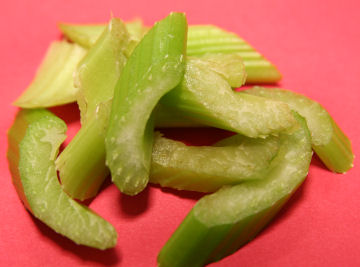The essence of celery
Tasteless compounds in celery give the vegetable essential flavoring powers.
By Emily Sohn
Celery has a certain something, as most chefs will tell you. Even though the vegetable’s flavor is mild, it’s an ingredient in a variety of soup recipes.
To figure out how celery has gained its popularity among cooks, Japanese scientists studied chemical compounds that give the vegetable its smell. In previous experiments, the researchers had zeroed in on a collection of these compounds, called phthalides (pronounced thaă’ līdz).
 |
|
Celery may seem fairly tasteless and boring, but surprise—some tasteless chemicals in this veggie really punch up the flavor of soups. |
| Courtesy of American Chemical Society |
For their most recent experiment, Kikue Kubota and colleagues added celery to a pot of water and then heated it. The team collected vapors that boiled off, leaving behind the solid parts of the vegetable. They added the solids to one pot of chicken broth. They cooled the vaporous compounds, which were now a liquid, and put them in a second pot. In both pots, the scientists added such a small amount of each substance that no one could possibly smell the celery in them.
The researchers also cooked up samples of broth to which they added each of four celery phthalides—again in amounts that were too small to smell. They left one pot of broth alone, with no elements of celery added.
Ten expert taste testers, all women, sampled and rated each type of broth, but weren’t told which soup was which. Then, they tasted many of the soups again while wearing nose clips. Smell affects taste, and the nose clips were used to separate what the tongue was sensing from what the nose was picking up.
Results showed that chicken broth with celery compounds from the cooled vapors tasted best, even though the evaporated parts had no flavor themselves. Three of the four phthalides also improved the broth’s flavor, but only when the tasters’ nostrils were left open.
The scientists concluded that celery’s flavoring power comes from compounds that we can smell but can’t taste.
So, even when you don’t think you can smell the vegetable in your soup, your nose is probably sensing some essences of celery that enhance your dining experience.
Going Deeper:
Ehrenberg, Rachel. 2008. Tasty stalks. Science News 173(Feb. 2):78. Available at http://www.sciencenews.org/articles/20080202/note18.asp .







